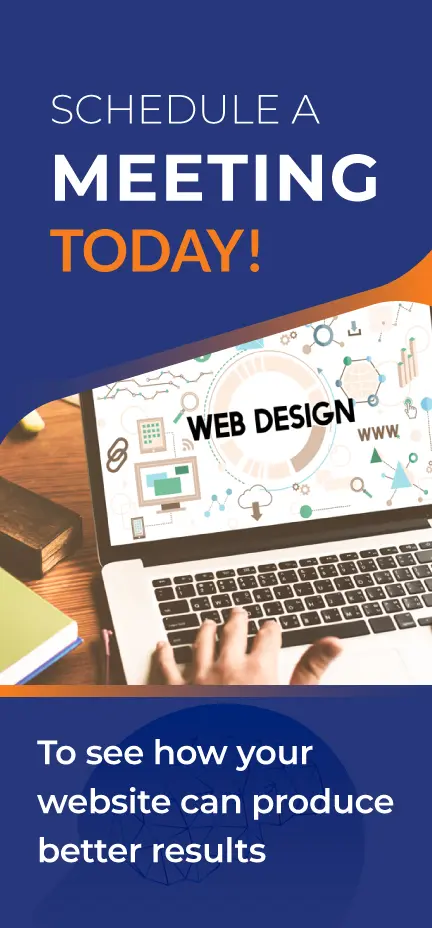Compelling Reasons Small Businesses Need an SEO-optimized Website
Small businesses these days need an SEO-optimized website to compete effectively. Long gone are the days of ginormous printed books (the old Yellow Pages) full of business ads and phone numbers that were mailed to every household and business. When customers need something, they start online. And, many times, they start punching in searches on their phone.
Launching a small business can be hectic, challenging and rewarding as well. No doubt marketing, advertising, and branding are at the top of your list. Having a digital presence should be a the top of your agenda.
Some businesses may opt to use a social media channel like Facebook or Instagram to forego the complexities of establishing a formal website. While we agree that social media is an integral part of successful marketing strategy, we are here to tell you that social media alone won’t get you where you want to go.
You need your own website to be your anchor and to be the core of your digital marketing efforts. Here are five compelling reasons why:
1. SEO Can Amplify the Visibility of Your Small Business Online
Search Engine Optimization is critical to your small business website. If potential clients and customers can’t find you on page one of the Search Engine Results Page, it’s as good as being invisible. Of course, you can purchase ads to be found on specific search engine results pages, but ideally you want organic search to do the bulk of the work for you.
By creating valuable content about your business, what you offer, and where you offer it, you can increase the likelihood of being found when people are searching for you online. There are technical aspects of SEO and local SEO techniques that can also help, too.
Don’t Rely on Social Media to Anchor Your Business
While search engines may pick up on your social media channel, relying on a social media channel to tell your small business’s story is risky. While social media may be part of your marketing strategy and it can be a good way attract certain customers, it should not be your anchor because it could go away at any time. You can pay for social posts to be shown to new audiences, but you can’t do anything about the algorithm which can change. At worst it can go away overnight. Consider the social media channel X, formerly known as Twitter.
Owning your own website and all the content on it is a completely different matter. You are in control of the content that goes on it, what it does, and what it says.
2. Your Website Creates Credibility for Your Small Business
Search engines and consumers alike are looking for credible sources. If your primary digital presence is a Facebook page, for example, not everyone will take that as seriously.
Having your own website establishes credibility that your business is real and professional. Having your own domain name is another signal that shows an elevated level of professionalism, too. You’ll own the leads you gather on your website, so you can use them for marketing purposes.
Don’t skip the “About Page” and “Why Choose Us” pages on your website because they are important pages you can use to showcase how you got started, your expertise and experience, and what makes you different from other small businesses like yours. If you need help writing content about your business, hiring a trusted content specialist who understands how to optimize your content for search is a good idea.
3. Use Your Blog to Amplify Your Expertise
We recommend using your blog on your website to amplify your content marketing strategy! Using your website as the basis of your blog, you can publish helpful and authoritative articles and publish them on your social media channels and through email or your email newsletter. When visitors click the links, they are pulled back to your website, where they can read more while checking out your products and services.
When it comes to content, feel free to be creative. Podcasts, videos, whitepapers, recorded webinars, eBooks, how-to guides, quizzes and more can fill out some of the content you have available on your website. When you post interesting content on your site, you can extend its reach by sharing it on social, seeking out media interviews or linkbacks through contributed content on high-authority sites, and when it makes sense, through advertising, too. This integrated strategy brings more traffic to your website where you can reap the benefits and measure your progress.
4. SEO-Optimized Content for Your Small Business Helps You Rank
Again, a website offers so much more in the way of content. SEO opportunities are rich when it comes to website pages. From your homepage to your ‘About Us’ page, you can implement keywords to snag top spots on search engine results pages. Then, you have the chance to instill quality content that will keep your visitors coming back. We have a whole guide for how to optimize content you write online.
Limitations of AI on Content
Some might embrace the promise of AI to write content for their website, but we urge caution on that front. Many blog articles we see generated by AI have errors, are too general to be helpful, and sound robotic. However, AI can be very helpful for idea generation and for outlining.
At the moment, search engines don’t care who writes the content, but they do care if the content doesn’t live up to Google’s ranking standards known as E-E-A-T (Expertise, Experience, Authority, and Trust). If you take that first draft and inject more details, personalize it with your own expertise and experience, and have a point of view that would be impossible for a language model to have, then you’re on the right track.
5. Do a Search on Your Competition to Inform Your Strategy
Do a quick search for your competitors. You can learn a lot from small businesses in your specific niche or an adjacent industry, and they don’t necessarily have to be in your area. What about their websites attracts you, and what functionality doesn’t work the way you wish it would? These datapoints can all be helpful information to share with your web developer before you get started on a website project.
Another way to search on your competitors is to research what keywords they rank for and what linkbacks they have. This can help you conceptualize how you might differentiate your own content strategy. It may also help you identify keywords or phrases to add to your list.
Local SEO Is Another Way to Optimize for Search
Depending on business, you may need to localize your website (local SEO), so it is very clear to search engines that your bakery, for example, is located in Alexandria, Virginia. Giving some thought about where you are operating can give a web developer what they need to know when they are optimizing your content for search engines. If you want to be found in specific zip codes, counties, cities, etc., be sure to mention those details before the SEO work is complete.
Rely on Expert Small Business Website Developers
Setting up a website might not be the first thing on your checklist, but in our opinion, it should be. You can sink a lot of time and energy setting up your own website with DIY website builders out there, but how well can they be optimized for search? Partnering with a website developer means you can concentrate on bigger priorities to grow your business while we handle the technical details. We have website starter plans for businesses who need to get up and running right away on up through custom website development, including e-commerce.
Contact us today to set up a complimentary consultation. Let us partner with you on your small business website, so it is optimized for search and is easier to find when visitors and potential customers seek you out.







